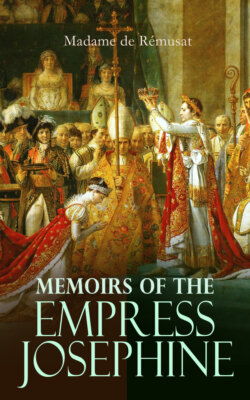Читать книгу Memoirs of the Empress Josephine - Madame de Rémusat - Страница 15
На сайте Литреса книга снята с продажи.
Lucien Bonaparte
ОглавлениеTable of Contents
Lucien Bonaparte has a great deal of ability. He displayed a taste for the arts and for certain kinds of literature at an early age. As a deputy from Corsica, some of his speeches in the Council of the Five Hundred were remarked at the time; among others, that which he made on the 22d of September, 1798, the anniversary of the foundation of the Republic. He there defined the oath that each member of the Council ought to take—to watch over the constitution and liberty, and to execrate any Frenchman who should endeavor to reëstablish royalty. On General Jourdan’s expressing some fears relative to the rumors that the Council was menaced with a speedy overthrow, Lucien reminded them of the existence of a decree which pronounced outlawry on all who should attack the inviolability of the national representation. It is probable that all the time he had a secret understanding with his brother, and was awaiting like him the approach of the hour when they might lay the foundation for the elevation of their family. There were, however, some constitutional ideas in Lucien’s head; and, perhaps, if he had been able to preserve any influence over his brother, he might have opposed the indefinite growth of arbitrary power. He succeeded in sending information to Napoleon in Egypt of the state of affairs in France; and, having thus hastened his brother’s return, he aided him effectually, as is well known, in the revolution of the 18th Brumaire, 1799.
Lucien afterward became Minister of the Interior, then Ambassador to Spain, and in both capacities he gave offense to the First Consul. Bonaparte did not like to remember services which had been rendered to him, and Lucien was in the habit of reminding him of them in an aggressive manner during their frequent altercations.
While he was in Spain he became very intimate with the Prince of the Peace, and assisted to arrange the treaty of Badajoz, which on that occasion saved Portugal from invasion.
He received a sum which has been estimated at five hundred millions of francs as a reward for his services. This was paid partly in money, and partly in diamonds. At this time he also formed a project of marriage between Bonaparte and an Infanta of Spain; but Napoleon, either from affection for his wife, or from fear of exciting the suspicions of the republicans, with whom he was still keeping on terms, rejected the idea of his marriage, which was to have been concluded through the agency of the Prince of the Peace.
In 1795 Lucien Bonaparte, who was then keeper of the military stores near Toulon, had married the daughter of an innkeeper, who bore him two daughters, and who died a few years later. The elder of these two girls was in after years recalled to France by the Emperor, who, when he saw his affairs going badly in Spain, wished to treat for peace with the Prince of the Asturias, and to make him marry this daughter of Lucien’s. But the young girl, who was placed under her grandmother’s care, too frankly imparted in her letters to her father the impression she received of her uncle’s Court; she ridiculed the most important personages, and her letters, having been opened, so irritated the Emperor that he sent her back to Italy.
In 1803 Lucien, now a widower and entirely devoted to a life of pleasure, to which I might indeed give a harsher name, fell suddenly in love with Mme. Jouberthon, the wife of a stock-broker. Her husband was promptly sent to Saint Domingo, where he died, and then this beautiful and clever woman managed to make Lucien marry her, despite the opposition of the First Consul. An open rupture took place between the two brothers on that occasion. Lucien left France in the spring of 1804, and established himself at Rome.
It is well known that since then he has devoted himself to the interests of the Pope, and has adroitly secured his protection; so much so that even now, although he was recalled to Paris at the period of the fatal enterprise of 1815, he was permitted to return, after the second restoration of the King, to the Roman States, and live quietly with those members of his family who had retired thither. Lucien was born in 1775.
